#Military Auxiliary
Explore tagged Tumblr posts
Text
Honoring the Civil Air Patrol: Celebrating 83 Years of Service and Dedication
As December 1 approaches, we at Death Dealer Tactical want to take a moment to honor the Civil Air Patrol (CAP) on its birthday. Established in 1941, the Civil Air Patrol is a vital organization that has played a significant role in American history and continues to serve our country in countless ways. From emergency response and search and rescue missions to aerospace education, the CAP embodies…
#Aerospace Education#American Aviation History#Aviation Enthusiasts#CAP Cadet Programs#CAP History#Civil Air Patrol Birthday#Civil Air Patrol Origins#Emergency Services#Military Auxiliary#Search and Rescue#Tactical Preparedness#The Death Dealer’s Tactical Handbook#Volunteer Opportunities
0 notes
Text

Poster showing the Women's Royal Air Force, Auxiliary and Reserve Air Forces badges of rank and distinguishing badges (c. 1950).
#vintage poster#british#royal air force#women's royal air force#Auxiliary Air Force#air force reserve#great britain#badges#rank#insignia#epaulettes#1950s#military
46 notes
·
View notes
Text

USMC Adversary at Gila Bend
#USMC#Marines#Northrop#F-5N#Tiger II#Fighter#Adversary Aircraft#jet#Military aircraft#VMFT-401#Gila Bend Auxiliary Field#adversary#plane#aircraft
41 notes
·
View notes
Text

Born 15 January 1918. Diana Barnato Walker MBE FRAeS (d.28 April 2008). One of the first women pilots of the Air Transport Auxiliary. Photographed climbing into a Spitfire cockpit during WWII. In 1963, she became the first British woman to break the sound barrier.
@ron_eisele via X
13 notes
·
View notes
Text
i just want everyone to know that i could write an essay about the sociological significance of american combat uniforms and all its unsurprisingly weird implications. i won't because the rain is making my brain goop, but i just want everyone to know that the possibility is always on the table
#ipj speaks#its not that i feel inarticulate on a word level but more so disorganized and incoherent on a topic level#my biggest fixation is the incredibly blatant fatphobia in uniform guidelines throughout all branches and auxiliary groups#but more specifically how it interacts with america's idolatric obsession with combat uniforms#and it bugs me in a way that while rooted in common-stance social justice i dont think i could articulate it with adequate empathy#simply because im doomed to be fixated on the logical and factual failings of bigoted policy and not the damage it causes the actual people#in short rather than risk writing a Tumblr Post that potentially mishandles important issues id rather just..not write one at all#not to mention i couldnt have less skin in the game. im fairly thin and my dad has told me Several times that i look like a sk*nhead#if the military ONLY cared about aesthetics i think id be kidnapped like a stray dog
0 notes
Text
Irene Arckles: Air Transport Auxiliary Pilot during WW2.
(DB colour from original unknown B&W image) Irene Arckless was described as an ordinary working class girl determined to obtain her pilots licence who passed her flying test just before the start of the Second World War. During the war she was a pilot with the Air Transport Auxiliary delivering all types of aircraft from factories to operational RAF airfields throughout England.On Sunday 3 June…

View On WordPress
0 notes
Text

How Hadrian’s Wall is Revealing a Hidden Side of Roman History
A party invitation. A broken flipflop. A wig. Letters of complaint about road conditions, and an urgent request for more beer.
It sounds like the aftermath of a successful spring break, but these items are nearly 2,000 years old.
They’re just some of the finds from Hadrian’s Wall – the 73-mile stone wall built as the northwestern boundary of the Roman Empire, sealing off Britannia (modern-day England and Wales) from Caledonia (essentially today’s Scotland).
While most of us think of Pompeii and Herculaneum if we’re thinking of everyday objects preserved from ancient Rome, this outpost in the wild north of the empire is home to some of the most extraordinary finds.
“It’s a very dramatic stamp on the countryside – there’s nothing more redolent of saying you’re entering the Roman empire than seeing that structure,” says Richard Abdy, lead curator of the British Museum’s current exhibition, Legion, which spotlights the everyday life of Roman soldiers, showcasing many finds from Hadrian’s Wall in the process. A tenth of the Roman army was based in Britain, and that makes the wall a great source of military material, he says.
But it’s not all about the soldiers, as excavations are showing.
A multicultural melting pot

Hadrian, who ordered the wall to be built in 122CE after a visit to Britannia, had a different vision of empire than his predecessors, says Frances McIntosh, curator for English Heritage’s 34 sites along Hadrian’s Wall.
“All the emperors before him were about expanding the empire, but Hadrian was known as the consolidator,” she says. He relinquished some of the territory acquired by his predecessor Trajan, and “decided to set the borders” – literally, in some cases, with wooden poles at sites in Germany, or with stone in Britannia. Where those poles rotted thousands of years ago, the wall is still standing: “A great visual reminder” of the Roman empire, says McIntosh.
It’s not just a wall. There’s a castle every mile along, and turrets at every third-of-a-mile point, with ditches and banks both north and south. “You can imagine the kind of impact that would have had, not just on the landscape but on the people living in the area,” says McIntosh.
And thanks to the finds from the wall, we know a surprising amount about those people.
Although historians have long thought of army outposts as remote, male-dominant places, the excavations along the wall show that’s not the case. Not only were soldiers accompanied by their families, but civilians would settle around the settlements to do business. “ You can almost see Housesteads as a garrison town,” says McIntosh. “There were places you could go for a drink and so on.”
The Roman rule of thumb was not to post soldiers in the place they came from, because of the risk of rebellion. That meant Hadrian’s Wall was a cultural melting point, with cohorts from modern-day Netherlands, Spain, Romania, Algeria, Iraq, Syria – and more. “It was possibly more multicultural because it was a focus point,” says McIntosh, who says that the surrounding community might have included traders from across the empire.
Soldiers were split into two groups. Legionaries were Roman citizens from Italy, who had more rights than other soldiers and imported olive oil, wine and garum (a sauce made from decomposing fish).
They worked alongside auxiliaries – soldiers from conquered provinces, who had fewer rights, but could usually acquire citizenship after 25 years of service.
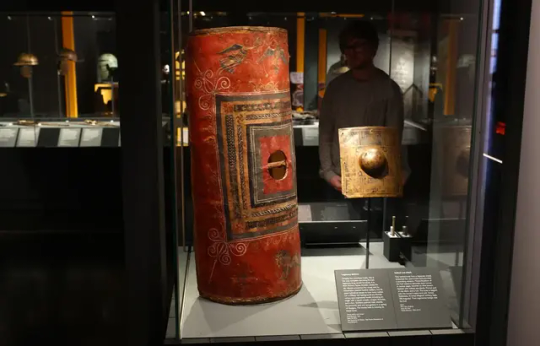
Soldiers carved their names and regiments on stones to show which part of the wall they built – around 50 of them are on display at Chesters fort.
But the wall shows that women and children were equally present.
McIntosh says that pottery brought to the camps – from the Low Countries and North Africa – shows that the soldiers “brought their families, who cooked in traditional style.” Archaeologists have found what seems to be an ancient tagine for North African-style cooking.
A tombstone from Arbeia fort for a woman named Regina shows she was a freed slave from southern Britain who was bought by – and married to – a Syrian soldier.
Another woman buried at Birdoswald fort was laid to rest with chainmail that appears to be from modern-day Poland. “Perhaps she married someone in the army,” says McIntosh, who calls the wall a “melting pot of people from all over the world under the banner of the army.”
“They brought their own religions, as well as worshipping Roman gods and adopting local deities,” she adds. At Carrawburgh, a temple to Mithras – an originally Persian deity – sat near a spring with a shrine to a local water spirit.
‘Wretched little Brits’
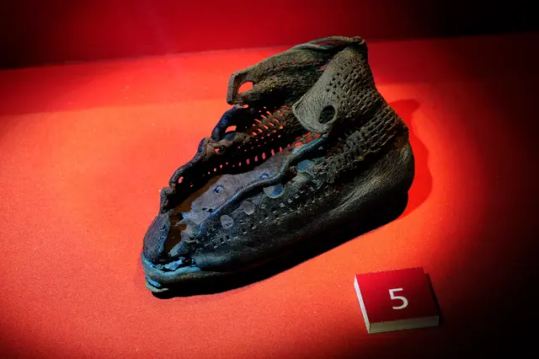
Some of the most extraordinary finds from the Roman empire are coming from one site on Hadrian’s Wall: Vindolanda. Here, archaeologists have found a wealth of organic remains because of what curator Barbara Birley calls the “unusual conditions onsite.”
At Vindolanda there are the remains of at least nine forts over 14 levels. “When the Romans would leave, they would knock down timber forts, and cover the area with turf and clay, sealing the layers underneath,” she says.
“Because it happened so many times, the bottom five or six layers are sealed in anaerobic conditions, so things don’t decay. When we get down there, we get wooden objects, textiles, anything organic.”
Vindolanda has the largest collection of Roman textiles from a single site in western Europe, as well as the largest leather collection of any site in the Roman empire – including 5,000 shoes, and even a broken leather flip-flop. “We probably had a population of 3,000 to 6,000 depending on the period, so 5,000 is a lot,” says Birley. For Abdy, the shoes evoke the conditions of the wet borderlands. “Women’s and children’s shoes are hobnailed – you needed it in the mucky frontier dirt tracks. They’re very evocative.”
There’s even a wig made from a local plant, hair moss, which is said to repel midges – the scourge of Scotland during the summer. A centurion’s helmet is also crested with hairmoss – the ancient equivalent of spraying yourself with insect repellent.
The first woman to write in Latin
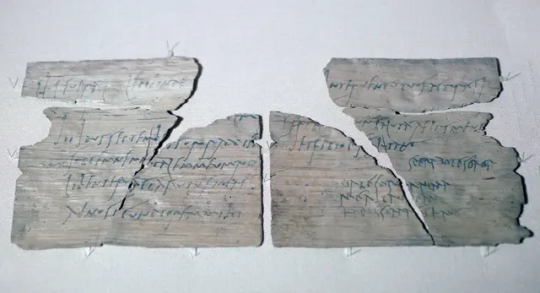
One of the most famous finds is the trove of wooden writing tablets – the largest found anywhere.
“They give a snapshot of what life was actually like,” says Birley. “We understand so much more from written correspondence than from ‘stuff,’ and, archaeologically, it’s the stuff that usually survives – things like metals and ceramics.
“These were written in ink, not on a wax stylus tablet, and we believe they were used for what we’d put in emails: ‘The roads are awful,’ ‘The soldiers need more beer.’ Everyday business.”
The tablets – or “personal letters” as Birley describes them – were found on the site of a bonfire when the ninth cohort of Batavians (in the modern-day Netherlands) were told to move on.
“They had a huge bonfire and lots of letters were chucked in the fire. Some have been singed – we think it may have rained,” she says. One of them calls the locals “Britunculi” – “wretched little Brits.” Another talks about an outbreak of pinkeye. One claims that the roads are too bad to send wagons; another laments that the soldiers have run out of beer.

Among the 1,700 letters are 20 that mention a woman called Sulpicia Lepidina. She was the wife of the commander of the garrison, and seems to have played a crucial role. There’s a letter to her from another woman, Paterna, agreeing to send her two medicines, one a fever cure.
Birley says it’s similar to today. “If you’re a group of moms, still today we say, ‘Do you have the Calpol?’ It’s very human.” For Abdy, it’s a sign that women were traders. “She’s clearly flogging her medicines,” he says. “It’s really great stuff.”
Another tablet is an invite from Claudia Severa, the wife of another commander at a nearby camp. It’s an invitation to a birthday party. Under the formal invitation, presumably written by a scribe, is a scrawl in another hand: “I shall expect you, sister. Farewell, sister, my dearest soul.”
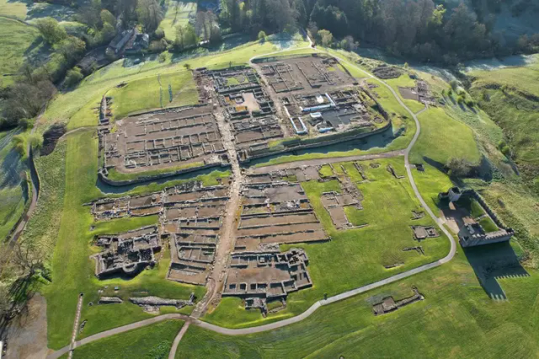
Presumably written by Claudia herself, it is thought to be the earliest example of a woman’s handwriting in Latin.
Without the organic finds – the shoes and the letters that indisputably belonged to women, unlike jewellery or weaving equipment – it’s difficult to prove conclusively that women lived in significant numbers. Vindolanda “illustrate the missing gaps,” says Abdy. For Birley, they prove that women were as crucial a part of army communities as men. “Before the Lepidina tablets were found we didn’t really understand the interactions between the soldiers and their wives,” she says. Another tablet is written by what is thought to be a Spanish standard-bearer’s common-law wife, ordering military equipment for her partner.
“The Vindolanda collection is showing that there weren’t just camp followers and prostitutes; women were part of everyday life, and contributing to the military community in many ways,” says Birley.

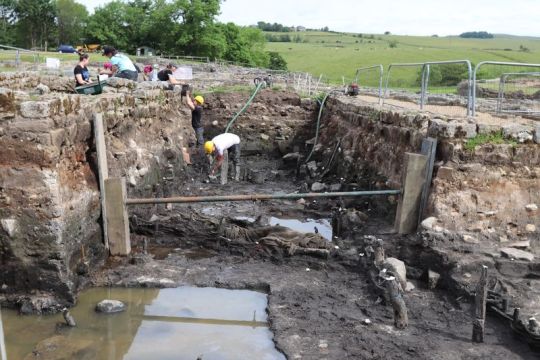
Abdy says that Hadrian’s Wall is interesting because the resident women span “all classes of society,” from Regina – the dead freedwoman, who would have been “bottom of the heap” – to the trader Paterna and the noblewoman Lepidina.
And of course, there’s the wall itself.
“In the Netherlands and Germany the finds are often stunning and better preserved – you go to museums and are bowled over. But in terms of structural remains, Hadrian’s Wall must be among the best,” says McIntosh, modestly, of her site.
Abdy agrees: “I can’t think of many symbols so redolent of imperial will than that wall.”
By Julia Buckley.

#How Hadrian’s Wall is Revealing a Hidden Side of Roman History#Hadrian’s Wall#emperor hadrian#northwestern boundary of the Roman Empire#Britannia#Caledonia#roman legions#ancient artifacts#archeology#archeolgst#history#history news#ancient history#ancient culture#ancient civilizations#roman history#roman empire#long post#long reads
912 notes
·
View notes
Text
Gregor Linguistic Analysis
Hello. I just finished Canto 1, so as I said, here are some things I found fun about the way Gregor speaks. I’ll do Rodya after Canto 2, and so on and so forth.
Do not mention any events after Canto 1 in the notes or tags of this post, thank you.

Gregor’s sentences are short to mid length, maintaining a natural, almost casual rhythm. His syntax is straightforward, avoiding complex subordinate clauses or elaborate phrasing. This reflects his laid-back and nonchalant attitude— his speech is efficient, unpretentious, and devoid of pretense. His words flow with a conversational ease, almost never rushed or clipped (despite his habit to drop subjects, compare him to someone like Ishmael, for example— he’s more warm), reinforcing his uncomplicated nature, which is something he really wants others to see— he wants to be a simple, regular man. He does not want to be seen as someone important.
He uses shortened constructions—such as omitting subject or auxiliary verbs—which gives his speech a relaxed, even offhand feel. In particular, when he talks about his past, he almost never talks proactively.
Fitting his casual speech and “action-oriented” past, Gregor also uses phrasal verbs in a casual context quite a bit. This also ties in with his tendency to downplay his personal struggles by speaking as if they were just ordinary events. When he does this, he also tends to pass the responsibility to his superiors, placing himself in the position of “but I’m just a guy, it’s (external thing).”. (His landlord, his manager).


Gregor is, however, quite the normal guy when it comes to how he speaks, so though there’s no much to say about his word choice outside of some strangely old-timey whimsical words every now and then (absolutely used to make him seem more warm, affable, and distinctively NOT like a strict military guy.) But there is quite a bit to say about what he “chooses” to say.
When talking about serious or painful things, he keeps it brief but adds this elliptical phrasing that lets the weight of his words sink in without outright stating it. He never spells out his emotions—his restraint makes the pain obvious without needing to say it. It’s less about what he says and more about what he holds back.

However, the most standout thing about the way Gregor speaks is the way he always subjugates himself whenever joking. Gregor himself says he does this.
However, his jokes about his arm will always hold more passive aggression and underlying hurt than his more elaborate, whimsical jokes about his previous military position— the topics that make him most upset.

He eases not only outright— but any potential hostility with humor. Consider the way he uses a mild, almost playful, word like “pest” to describe his condition—it reflects the level of detachment he’s employing in his suffering, a detachment that very much is the only thing helping him manage that suffering. He can’t open about how much discomfort it causes him, so fashions it as a palatable thing others can laugh at WITH him, instead of AGAINST him.
He believes people will always mock him, and even more importantly thinks there is something worth mocking about him, so this humor is always light hearted and easy to ignore. He does not challenge others cruelty towards him.
It’s not so big of a deal that people see him as something other if he’s not dangerous. He’s a monster, but just a small one. A pest. Insignificant.

In this same way he often uses rhetorical questions and double negatives to get his point across on this topic. For example, when he says the above, he’s highlighting the unpleasantness of his arm without directly addressing the actual discomfort it causes others. It’s his way of communicating subtly— avoiding bitterness or confrontation, trying to force himself into the “joke” of how revolting he is. Another way he does this is by referring to the other soldiers as “things”. Othering himself.
So despite his ease with small talk (being the first to introduce himself to us), his deeper emotions often surface in the spaces between words. He lets the quiet do the heavy lifting, as he is unwilling to say things plainly.

His distaste for status is reflected most simply in how he speaks to Dante.
“Manager Bud” → “Bud” softens authority. It reflects his preference for informal, cordial relationships rather than professional ones. The very concept of a work life similar to the military structure he knows is something he is absolutely terrified of. He does not like putting people higher or lower than him.
Gregor’s speech register is informal, with a blend of
- Working class pragmatism
- Older, slightly rustic quirks (usually one off words like “bugger”)
- Military lingo (in particular, he mentions “getting medals” a lot where others would say “rewarded”.)
In conclusion: He is someone who has been through a range of social settings but refuses to perform “proper” speech anymore in any effort to seem like a regular citizen, something he feels deeply he is not, and so he uses humor to feel as if he is “in” on the joke of how revolting he is.
307 notes
·
View notes
Text
Hadrian's Wall

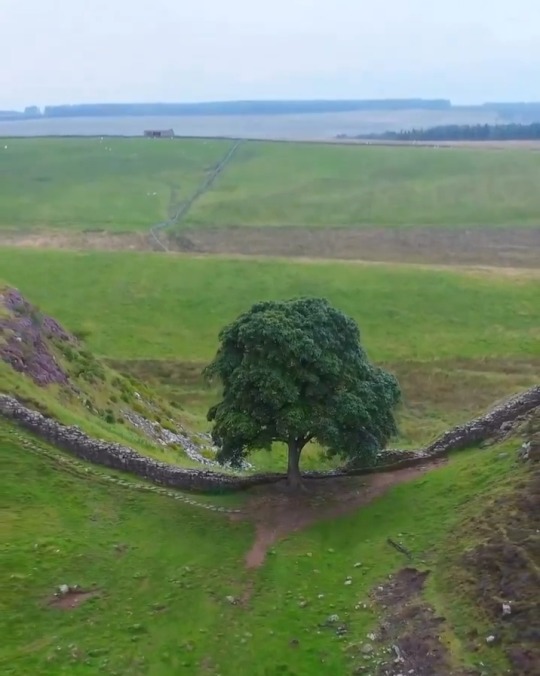

Hadrian's Wall is an impressive masterpiece of military engineering built along steep ups and downs that cross space and history between England and Scotland.
The old wall, sculpted for almost 2000 years by wind and rain, climbs over hills, immerses itself in a moor to suddenly resurface among the blades of light of a wood, a karst presence that seems to absorb the energy of landscape to challenge its gravity and logic in a rollercoaster of harsh ups and downs that cross space and history.
Hadrian's Wall is no longer England but it is not yet Scotland, even if the land to the north seems wilder.
But perhaps it is just a state of mind of those who look at it, subtly altered by the emotion of treading the same stones on which the Roman legionaries walked.
In reality, unlike what many believe, the Wall is within English territory, even if it has helped define the borders of the two countries since the emperor from whom it takes its name ordered its construction in 122 AD to "separate the Romans from the barbarians," the hostile tribes of the Picts who populated today's Scotland, a tough nut to crack even for the Roman legions.
To build it in just six years, about fifteen thousand men were employed, three legions that faced the challenges of a terrain carefully chosen to exploit its advantages.
The result is an impressive masterpiece of military engineering, a UNESCO World Heritage Site since 1987, stretching from one coast of England to the other for eighty Roman miles, about one hundred and seventeen kilometers from Solway Firth to the west and Wallsend to the east.
It is one of the many place names linked to its existence and then extending southwards with ports and coastal fortifications.
For nearly three centuries, Hadrian's Wall was northernmost and most fortified boundary of the Roman limes, a gigantic defensive system that stretched for over five thousand kilometres — from the Atlantic coast of Great Britain to the Black Sea across Europe — then continuing through present-day Middle East to Red Sea and from there cutting across North Africa to the Atlantic.
The 117km long (80 Roman miles) Hadrian's Wall was punctuated by 14 main forts, 80 minor ones and 2 watchtowers every third of a mile.
In addition to the actual wall, mainly made of stone, about 5m high and up to 3m thick, becoming six metres thick in the earthen sections, the Wall was reinforced by a ditch bristling with pointed stakes, a military road that connected the forts and allowed any point to be reached quickly and by a deep embankment, the Vallum.
The forts, rectangular in plan, varied in size according to the importance of the garrison, a pattern repeated with slight differences along the entire limes that protected the borders of the empire.
A moat and a wall punctuated by towers protected the perimeter and each side had a gate protected by two massive towers.
Inside were the headquarters — the praetorium where the praefectus castrorum reside; barracks; a hospital; warehouses and latrines, generally under the walls, while the bathrooms were outside the fortifications.
In granary, food supplies were stored to face the harsh winters or possible sieges.
In the Vicus, the civilian settlement, lived the families of the soldiers, often auxiliaries who officially could not marry.
In these villages that grew spontaneously around the forts, merchants, artisans and prostitutes also lived, attracted by the soldiers' wages.
There were also temples dedicated to Roman, local and even oriental deities that reflected the different religions of soldiers from all over the empire because Romans were very tolerant as long as the social order and the emperor were not questioned.
🎥: © pindropandhop via IG
#Hadrian's Wall#England#Scotland#Emperor Hadrian#Britannia#defensive fortification #stonewall#UNESCO World Heritage Site #British cultural icon#military engineering
85 notes
·
View notes
Text
I've never really cared for Bianca either way. I didn't get why people liked her enough to defend her so much or disliked her to unfathomable extents. But, come to think of it, her character writing is...well, problematic. The narrative tries to give her the "parentification" card but fails on account of elementary logic and common sense :
● Lotus Hotel and Casino : Honestly, the whole "she raised Nico for 70 years" is pure tripe. It is implied that the hotel panders to all your needs. Food, shelter, entertainment. You name it, you have it. It's basically diet elysium. She really didn't have to do any fending for Nico. They were both likely caught in the trap of games and luxury. Parentified? More like having the time of her life along with Nico.

(excerpt from The lightning thief)
● Westover Hall: In this scenario, things become more complicated. But basic sense suggests that they had different dorms, being two grades apart and of different genders. There's a 10 to 1 chance Nico had a dorm mother, teachers and other authorities to look out for him. Sure Bianca might have had to spend some time with him, but that really isn't the same as parenting. Besides, they were probably busy with school work, and other extra-curricular activities. Moreover, it's a military school, so I doubt they could just frolic about with each other 24/7.
Given everything, the parentification argument falls apart for sure. Which brings us to a rather concerning, yet obvious conclusion: Bianca's just a satellite, auxiliary character for Nico's development.
Closing thoughts: This just one of the countless instances where logic and sense were sidelined, and a female character was used as a plot device.
#bianca di angelo#nico di angelo#the titans curse#pjo meta#rr crit#anti rr#pjo fandom#percy jackson#pjo hoo toa#blood of olympus#heroes of olympus
70 notes
·
View notes
Text
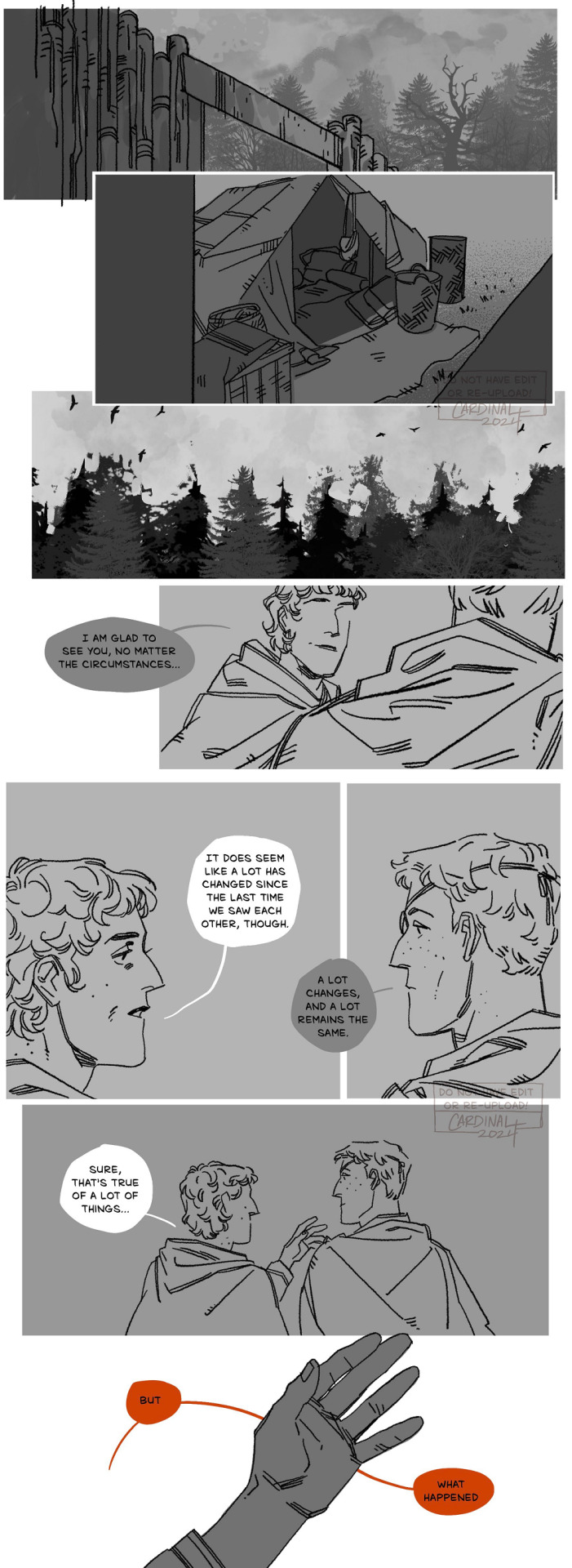
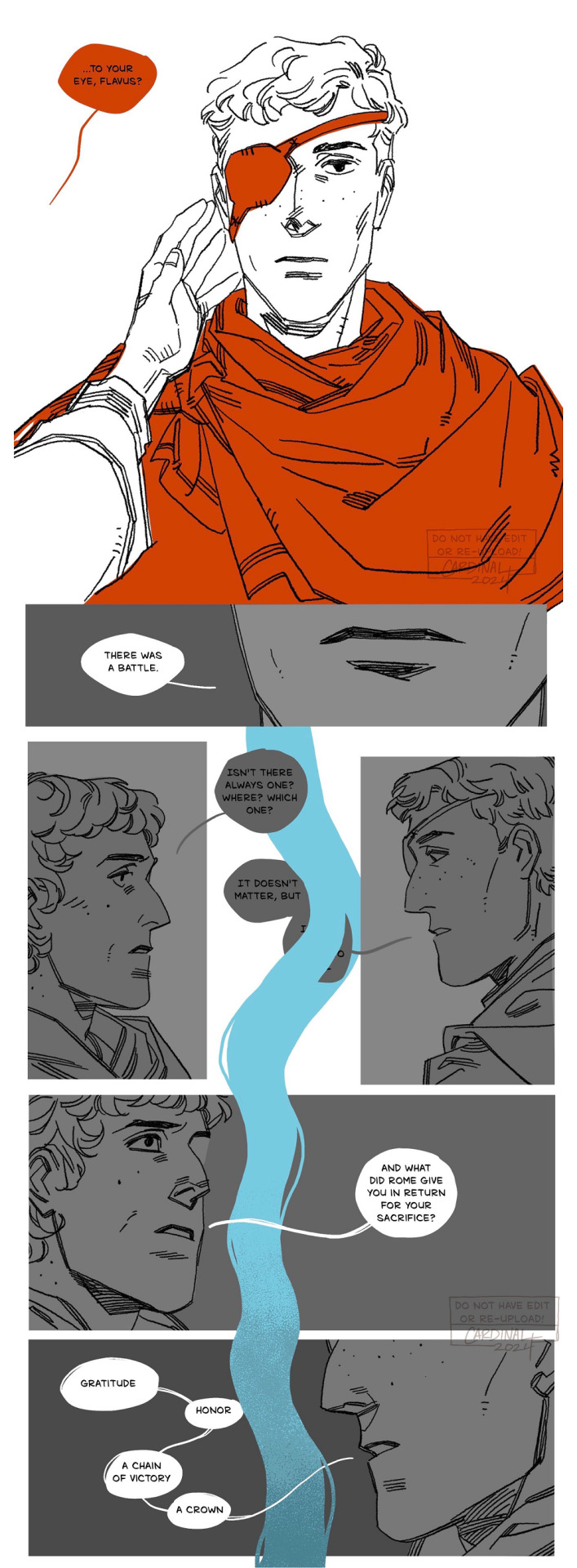
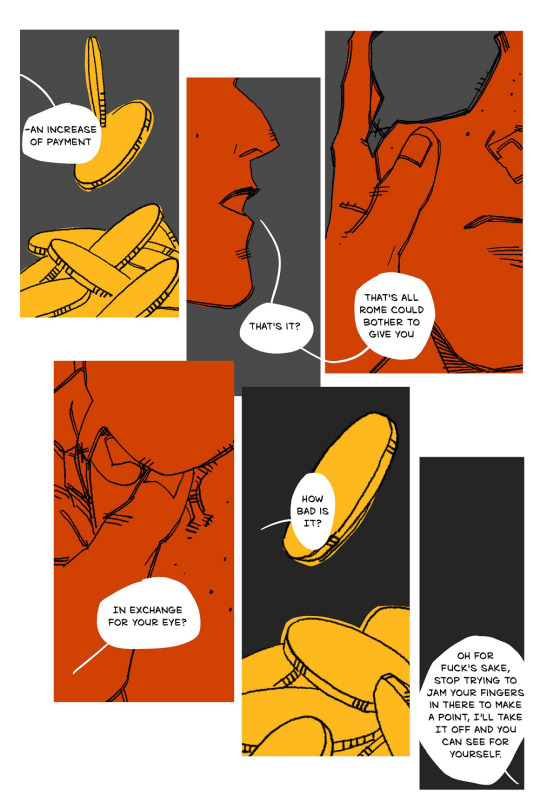
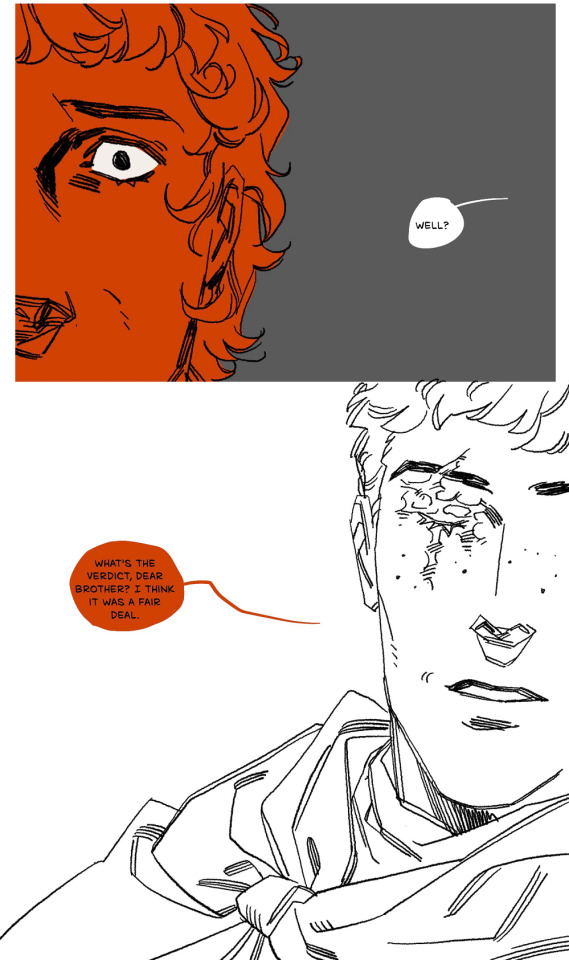
BROTHERS
The river Weser ran between the Roman and Cheruscan forces. Arminius came to the bank and halted with his fellow chieftains:— "Had the Caesar come?" he inquired. On receiving the reply that he was in presence, he asked to be allowed to speak with his brother. That brother, Flavus by name, was serving in the army, a conspicuous figure both from his loyalty and from the loss of an eye through a wound received some few years before during Tiberius' term of command. Leave was granted, and Stertinius took him down to the river. Walking forward, he was greeted by Arminius; who, dismissing his own escort, demanded that the archers posted along our side of the stream should be also withdrawn. When these had retired, he asked his brother, whence the disfigurement of his face? On being told the place and battle, he inquired what reward he had received. Flavus mentioned his increased pay, the chain, the crown, and other military decorations; Arminius scoffed at the cheap rewards of servitude.
They now began to argue from their opposite points of view. Flavus insisted on "Roman greatness, the power of the Caesar; the heavy penalties for the vanquished; the mercy always waiting for him who submitted himself. Even Arminius' wife and child were not treated as enemies." His brother urged "the sacred call of their country; their ancestral liberty; the gods of their German hearths; and their mother, who prayed, with himself, that he would not choose the title of renegade and traitor to his kindred, to the kindred of his wife, to the whole of his race in fact, before that of their liberator." From this point they drifted, little by little, into recriminations; and not even the intervening river would have prevented a duel, had not Stertinius run up and laid a restraining hand on Flavus, who in the fullness of his anger was calling for his weapons and his horse. On the other side Arminius was visible, shouting threats and challenging to battle: for he kept interjecting much in Latin, as he had seen service in the Roman camp as a captain of native auxiliaries.
Tacitus Annals 2.10-11
there's a lot going on in there! Arminius switching to Latin is a detail that always makes me feel a deep kind of sadness, especially with how it's preceded by mention of their mother. I wonder what she thought of what became of her sons, on opposite sides of everything but still, inescapably, brothers. even when they want to kill each other. there sure are a lot of fucked up and unhappy brothers around. and Arminius asking about Flavus' injury............I also had a whole thing typed out about the horror of imperialism and colonization and the trauma of assimilation but I think this sets the tone better
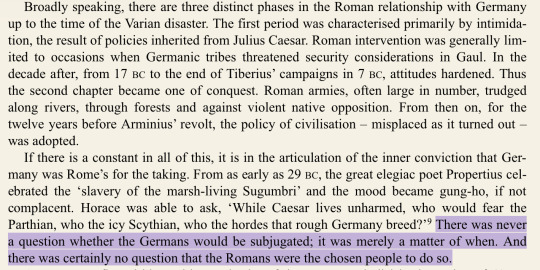
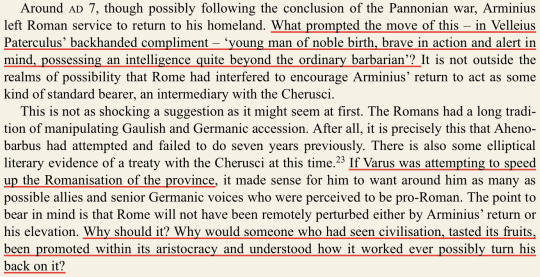
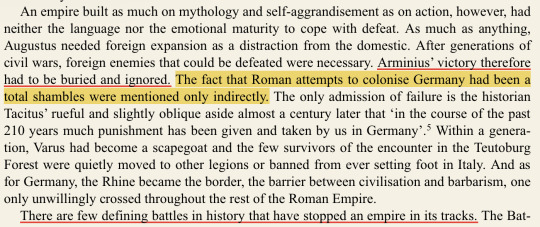
Rome's Greatest Defeat: Massacre in the Teutoburg Forest, Adrian Murdoch
and also this, just for fun

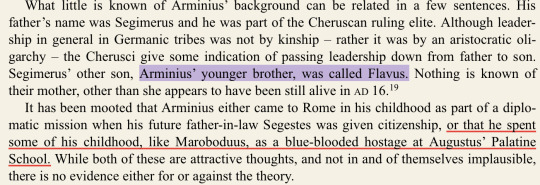

(ibid)
this post is already a mile long, so lets add another mile to it: a little scene at the start of their conversation! tfw you go in for a hug and your younger brother who also ended up being taller starts roasting your hair style
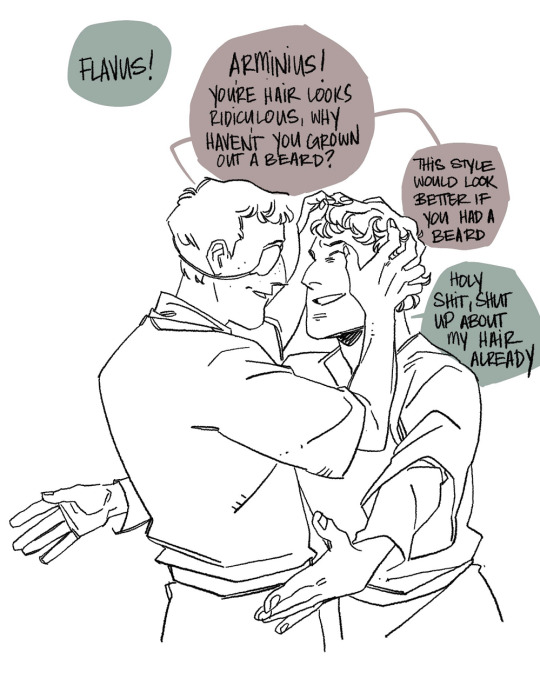
bsky ⭐ pixiv ⭐ pillowfort ⭐ cohost ⭐ cara.app⭐ko-fi
#long post#SO LONG#roman empire tag#tbh im not jazzed about using that tag when rome is not actually the setting here but i do not have a good era tag for this yet#i'll figure it out later eurhghghesuerhgh#komiks tag#arminius & flavus#idk. maybe also#eye trauma cw#anyway it's all very 'he's my brother and i need a shovel to love him' kind of deal#this (wheezing) this is an idea i had LAST YEAR but it was a solo illustration#i had it posted for about ten minutes before i decided it sucked ass and needed to be revisited as a comic#FINALLY. the idea is complete. im free. it's been bothering me to have it unfinished while the original idea was haunting my drafts#as a reminder to get it done. and now i can delete it. au revoir illustration you will not be missed
353 notes
·
View notes
Text
How does Ulfric expect to "take the fight to the Thalmor" when he basically needs the Dragonborn to win his war against a *single* legion of Imperial auxiliaries?
Even High Rock is leaving Ulfric on read. I assume most other nations would be similarly disinterested. Presumably Ulfrics greatest hope is to lead an alliance of nations (along with The Empire?) against the Thalmor.
IMO the free nations of Tamriel are waaaayyy too divided and mutually hostile to somehow unite with enough force to defeat the Aldmeri Dominion.
Cyrodiil: hates Ulfric (duh). High Rock: aloof and loyal to Cyrodil. Morrowind: hates and distrusts all outsiders and foreign powers, especially post-Oblivion. Black Marsh: pretty much the same as Morrowind and possibly even worse. All that leaves is Hammerfell and even they have lingering issues with internal political stability. The others could perhaps be convinced, but I'm not sure how or why they would risk joining Ulfrics alliance unless the Thalmor were actively attempting to invade those nations.
IMO the best best beeesst hope Ulfric has is a potential alliance with Hammerfell against the Thalmor.
"That alliance could win since Hammerfell alone fought the Thalmor to a standstill!" Yes maybe! But Ulfrics war would have to be an offensive war. Hammerfell fought defensively in friendly territory. Offensive wars are by nature far more costly for the attacking force and the alliance would have to remove the Thalmor from any territory on mainland Tamriel *at minimum* for a meaningful victory.
"Kill elves in big heroric battles" isn't a plan. Removing Thalmor puppet governments and liberating occupied territory is. The hypothetical alliance would have to enter hostile territory and attempt to liberate Valenwood and Elsweyr. I'm sure there's anti-Thalmor factions in those places that would help as best they can, but the victory would have to be won via outright military means.
All in all, even a revived and unified Mede empire would have rough odds against the Thalmor. Im not sure what Ulfric expects his path to victory to be.
Perhaps he's more inspired than i give him credit for, or perhaps his confidence is all a naïve delusion on his part. I'm biased but I suspect it's the latter.
68 notes
·
View notes
Text
Why The Tau Were Never 'Too Good' For 40k

The Tau were added midway through Warhammer 40,000's 3rd edition, though according to some records the idea had been floating around since Laserburn. In the twenty years since their introduction to the 41st millennium, the Tau have remained one of the most consistently reviled and hated aspect of 40k lore, with all complaints around them boiling down to one core issue: they're too good for 40k. By that, people mean that they are too morally good to fit within the grimdark narrative of the 41st millennium. This has always been the primary complaint levied at them, since they were first introduced in 2001. And GW has seemingly agreed with them, and spent the last 20 years trying to inject grimdarkness into the Tau Empire.
The first attempt to grimdarkify the Tau came very early on, with the Tau campaign in Dawn of War: Dark Crusade
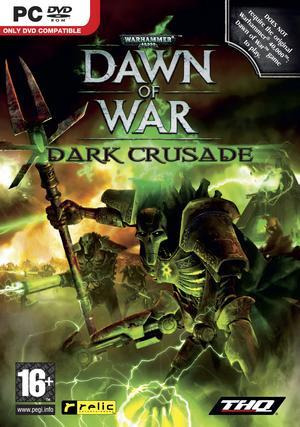
It's explained how in the decade following Tau victory on Kronus the remaining human population was subjugated, oppressed, forced to give up their culture, and eventually simply sterilized and allowed to die off naturally to create a Tau and Kroot ethnostate on Kronus. It explains this over images of prisoners of war being fed to Krootox in prison camps and humans huddling together in slums.
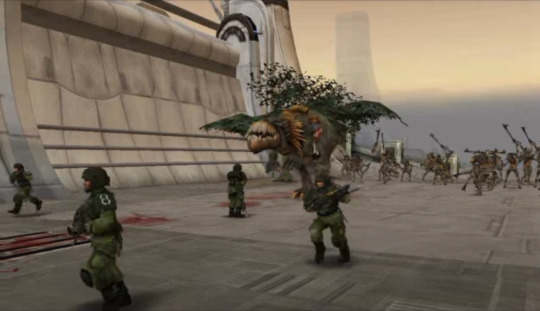

This is obviously a departure from the image of the Tau as it was established in Codex: Tau (3rd Edition), as that codex makes explicit mention of the Tau trading and making alliances with frontier human colonies. This is also a departure from... common sense. Why exactly would the Tau accept Kroot, Vespid, Nicassar, Demiurg, Tarellians and many others into their ranks but then arbitrarily draw the line at humans?
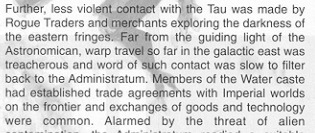
This would become a pattern that I like to call "The Grimderp Tau Cycle." It's not exactly a stretch to say that the Tau are easily the most morally good society in the 41st millennium. Their tolerance toward other species alone makes them head and shoulders above almost any other species in the galaxy. So to remind people that there are no good guys in the 41st millennium and that this is a very serious and grimdark setting that you need to take seriously because there are no good guys or whatever, GW will occasionally have the Tau commit a completely out of character, random, and nonsensical atrocity. This was also seen at the end of In Harmony Restored, the short story that came out alongside 8th edition's Psychic Awakening: The Greater Good.
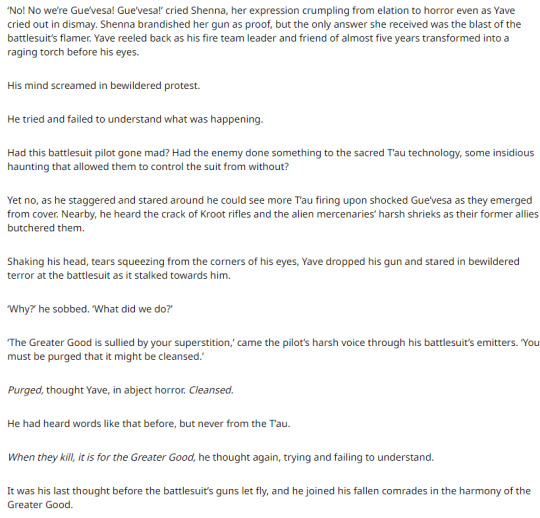
For context, In Harmony Restored is a short story about a group of Gue'vesa soldiers (human auxiliary troops fighting in the Tau military) performing a desperate defensive rearguard action to halt an Imperial advance long enough for Tau reinforcements to come and smash the delayed invasion force. The Gue'vesa are able to do this, though at great sacrifice to themselves, and then when the reinforcing army does arrive and makes quick work of the Imperial army they then continue on to butcher the Gue'vesa soldiers who performed this valiant holding action for... Seemingly no reason? Assuming the Tau forces thought they were more Astra Militarum soldiers, the Gue'vesa step out of cover pleading for mercy, only to be gunned down. With one of the Gue'vesa at the end noting that the language one of the Battlesuit pilots is using is very reminiscent of the way the Imperium talks about those they've labeled undesirables.
The message here is clear: these humans betrayed the Imperium in order to escape from the Imperium's genocidal regime... Only to end up in the equally merciless clutches of an equally ruthless oppressor. But, from a lore standpoint, that defeats the entire purpose of the Tau. It makes them wholly indistinct and, frankly, boring. But that doesn't even scratch the surface of how stupid this is, because it has clearly been stated in the past that the Tau do not hold bigotries toward client species on the basis of their faiths. And that makes sense.
Not only does this contradict previous lore, not only does it render the Tau a boring palette swapped version of the Imperium, it also just defies practical sense. If you're a race like the Tau, who expand primarily through ingratiating yourself with other races and convincing them to join your collective, you'd naturally want as few barriers between potential client races and joining as possible. No human colony is going to voluntarily join the Greater Good if the Tau's version of the Greater Good happens to require that the human population of that planet lose all sense of their heritage and culture through forced reeducation and the abandonment of their faith, and in the long term for that human population to slowly go extinct through gradual forced sterilization and confinement to ghettos and slums.
It's deeply stupid, lazy writing on the part of GW to repair the image of the Tau in the eyes of a fandom who accused the faction of being "too good." Except, uhm, here's the thing: the Tau were never too good to begin with. Lets rewind back to 3rd Edition's Tau Codex, our first introduction to the Tau in the 40k universe. From the very beginning it was very clear that the Utopian idealism of the Tau Empire held beneath the surface a significantly more sinister and malevolent nature, and it all roots from the mysterious and enigmatic fifth caste of Tau Society: the Ethereals.

In 3rd Edition, the Ethereals are spoken of more like mythological beings than the slightly mundane way they exist in modern 40k. All we know about them out of this book is that they are the autocratic leaders of the Tau Empire who inspire radical devotion among the Tau, though are rarely seen or heard from. They reorganized Tau society with pursuit of the Greater Good in mind first. But the specifics of what that means matters a lot. Tau are born into a caste that roughly determines, from birth, what role in society that person will fulfill. Those born into a caste are not allowed to have children with members of other castes, are not allowed to take up any job or position that contradicts the societal purpose of their caste, and generally lack self-determination in regards to things like career choice.
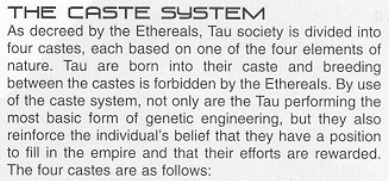
so, bam, the setup for Tau as a flawed and morally ambiguous faction are already present. They're a faction who fight for a better future, for a galaxy where all can exist in harmony with one another, so long as that harmony is kosher by the standards of the Ethereal caste. In that sense they're somewhat similar to the Dominion from Star Trek: Deep Space Nine. A multispecies interstellar collective who seek to create a galaxy harmoniously unified... in service to the Founders. Just taken from this vision of the Tau Empire, they're already an autocratic dictatorship who fight in the name of an ideology that declares itself to be for the greater good of all who ascribe to it while also relying on the assumption that the tyrannical power of the Ethereals must inherently be for the Greater Good. I reject the idea that the Tau were ever "too good" for 40k. Rather that they were written with a realistic level of nuance, with an understanding that dictatorships are built upon cognitive dissonance, not on perfectly consistent virtues.
TL;DR THEY'RE NOT FUCKING COMMUNISTS, THEY LITERALLY HAVE A CASTE SYSTEM, WHAT THE FUCK ARE YOU TALKING ABOUT?!
#warhammer40k#warhammer#warhammer 40k#t'au empire#t'au#fire warrior#in this essay i will#wargaming#warhammer lore
413 notes
·
View notes
Text
Shattered Eagle RO Descriptions
Hi all, I got some questions on what the ROs look like and their personalities, so I thought I'd share what I had in mind while writing. All of the ROs are some shade of bisexual, if I hadn't noted that already.
Empress Julia Vitallia Hevernica: The Empress of Iudia is a forty-eight year old woman of average height, with a fair complexion and dark black hair on a slow but steady journey to silver. She has gray eyes which tend to bore icily into whoever she happens to be speaking with. Even as Empress, she has remained active from many years of military campaigning, with a fit and athletic physique. She tends to wear her hair short, barely reaching past her ears.
She is known to be cruel to her enemies, ruling through fear of her merciless wrath. Nevertheless, as a savvy politician, she takes care to project an image of harsh, yet fair, justice at her hand, if dealt with in good faith.
In her most personal relationships, Julia can often be more distant than she intends, as she seeks out understanding and care from her loved ones, despite her cold exterior. She is well known to be estranged from her husband.
Legate Antonius Lethungius/Amalrik Wulfhid: The general of the barbarian auxiliaries is a tall, clean shaven, forty year old man with a great blonde mane of hair. His once youthful good looks have, however, been marred by the scars of countless bloody wars. He has bright green eyes, flecked with a faint gold. A formidable foe in battle, he bears a strong and stout frame.
The Legate is half of 'civilized Iudia' and half of 'barbarous Gruthungia,' and everything from what clothes he wears to what accent he speaks with may change by the audience he finds himself in front of.
As a result, it is difficult to tell whether he is a a fierce, unbowed barbarian warrior, or a obedient, dutiful son of the Empire, an ambiguity is he seems content to maintain.
Ever careful about who he lets get too close, the Legate has been known to be somewhat aloof, trying to steer clear from personal relationships, supposedly out of his sense of obligation to his soldiers and their needs. His resultant lack of experience is then a source of embarrassment, though he does not let others know this readily.
Consul Consentia Plinia Dorcia: An older woman of fifty-four years old with a fair complexion, Consentia nevertheless has features that have aged as well as a fine vintage. Her dark brown hair, once near matching her brown eyes, has long since turned grey, however, reaching down a few inches past her shoulders.
Refusing the indulgences that many of the matrician class enjoy, Consentia is healthy and fit for her age, considering the long hours of work she tirelessly puts herself through for the business of the Senate.
Carrying elegance with her every step, she is well known to be polite and courteous to all in search of a new, more republican form of government, though she reserves ire for the 'barbarians' she views as emblematic of Iudia's decline. She is also a skilled orator, giving rousing speeches filled with carefully crafted rhetoric.
In her personal relationships, the Consul has been widowed for many years, having eschewed remarriage. Some whisper she has taken on a paramour or two in the past decades, though few socialites are brave enough to do more than speculate on the matter.
Tribune Ceto Vera: The Tribune is a thirty-eight year old woman with shoulder-length brown hair, an olive complexion and hazel eyes. Her features are calloused and weathered from her upbringing in the harsh streets of the slums of Kyro, an attribute most expressed in her scandalously low-class accent, a trait which she proudly bears even amongst the highest of matricians.
Though she stands rather short, Ceto carries a lean frame, her quick reflexes lending her a vicious talent with a dagger.
Despite her brusque demeanor and crude humor with the ladies of Kyro, however, she carries a talent for rousing the passions of the dispossessed and the discontented, using her criminal empire to generously reward those lending a voice to her populist cause, and ruthlessly make examples out of those who would refuse.
Ceto's personal life is shrouded from the knowledge of most, for all her shameless comments and advances she does not speak much on her past relationships. Nor of how she came to rise to power in the streets, both mysteries being either a source of regret or resentment for her.
Prince Darius of Pharia: Darius is a thirty-three year old man, standing at an average height, with black curly hair, a rich brown complexion, and a short and well groomed beard. In public, he bedecks himself in silks, radiant colors, and copious amounts of fine jewelry.
Trained as a warrior as any Prince should be, he is most skilled in the Pharian repeating crossbow, a curious invention that few Iudians have ever wielded.
Despite his status as a foreign hostage, the man has a charming, almost obsequious manner about him, inviting many dignitaries and notables of the capital for tea and idle talk at his embassy, which supposedly functions as his cage.
Darius often speaks of himself as an open book, and has carried on more than a few flings during his time in Iudia, though none have stuck around very long in the Prince's company.
#choice of games#cyoa game#hosted games#if wip#interactive fiction#interactive novel#shattered eagle#wip game#shattered eagle: fall of an empire
56 notes
·
View notes
Text
Anna Leska-Daab: ATA Ferry Pilot in England during WW2.
Original B&W image source unknown. Anna Leska-Daab obtained her glider and balloon pilot licence at the Warsaw Flying Club. After escaping to England through Romania and France she was one of three Polish women serving with the ATA (Air Transport Auxiliary) She was Stationed at Hatfield and Hamble and ferried a total of 1,295 aircraft including 557 Supermarine Spitfires. She flew 93 types of…
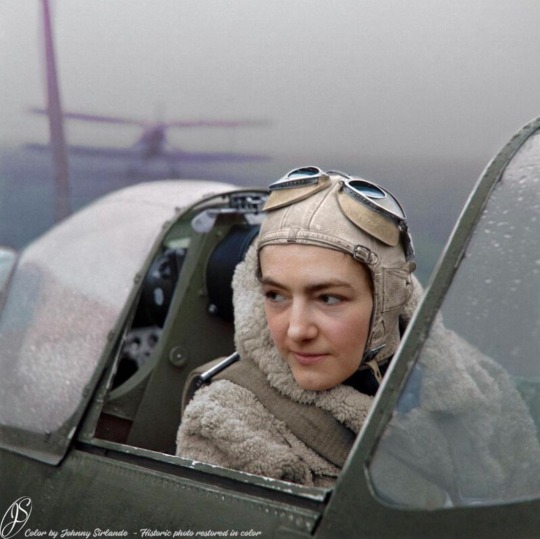
View On WordPress
0 notes
Photo

The Year of the Four Emperors & the Demise of Four Roman Legions
During the Year of the Four Emperors (69 CE), the fight between Vitellius and Vespasian would ultimately bring about the demise of four legions, the XV Primigenia, I Germanica, IIII Macedonica, and XVI Gallia. All four of these legions had previously served the Roman Empire with distinction under such leaders as Pompey and Octavian but made what turned out to be the wrong choice in 69 CE. While there remains a question concerning the loyalty of XV Primigenia, three of the legions made the mistake of supporting Vitellius.
Roman Expansion
Originally, the Roman army consisted of a citizen-based militia recruited from the propertied citizens. However, the consulship of Gaius Marius (l. 157-86 BCE) brought a number of changes. Property ownership not being a requirement anymore, the Marian Reforms allowed the Roman army to reinvent itself as a professional fighting force. Another significant change came in the reorganization of the legion. The new legion was broken into centuries and cohorts. A centurion, commanded a century of 80 men (not 100) – six of these centuries equaled a cohort of 480 men. With the rebirth of the legion, the legionary became a well-trained and disciplined foot soldier, fighting as part of a well-organized unit.
With Gnaeus Pompey’s (106-48 BCE) venture into Spain and Caesar’s assault on Gaul, the number of legions increased dramatically. As the empire expanded, more legions were necessary to keep the frontier borders secure. Before the time of the first Roman emperor Augustus (Octavian) (27 BCE - 14 CE), the Roman army was constantly on the march, relying on temporary camps more than permanent fortresses. As the borders of the empire expanded, permanent fortresses began to replace the marching camps. This move helped to stabilize the frontier.
After his successful return to Rome, Augustus wanted to be assured that his legionaries were loyal to him and not a usurper. Each soldier had to take an oath of allegiance to the Roman emperor, the ius iurandum: an oath renewed every year, on 3 January. Next, Augustus reduced the number of legions from 60 to 28. These 28 legions became 25 after the Roman commander Publius Quinctilius Varus (46 BCE - 9 CE) lost three legions - XVII, XVIII, and XIX - in the disastrous Battle of Teutoburg Forest. Most of the 25 legions were stationed in the troubled provinces and along the borders - only nine cohorts were assigned to Italy with three of these in Rome. In the end, Rome had a standing army of 150,000 legionaries and 180,000 auxiliary infantry and cavalry.
The empire’s expansion brought them into contact with a population of different customs, languages, and religions. To deal with this disparity and maintain the peace, the Pax Romana, the Romans relied on the army. According to historian Stephen Dando-Collins in his book Legions of Rome, the 1st and early 2nd century CE was the golden age of the legion when they "swept all before them." He considered the Roman legion of the imperial era to be "a triumph of organization.” He added, "… each component from heavy infantry to cavalry, artillery to supporting auxiliary light infantry, fitting neatly together to form a solid, self-contained military machine." (10)
Continue reading...
30 notes
·
View notes